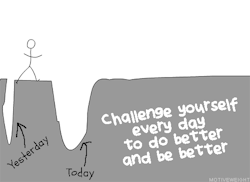Contrary to popular belief, college isn’t a four year-long beer pong tournament. Devotion to learning, motivation to make it to class and keep up with the work proves its level up from high school. From the words of our own professors, the expectations for students in 2017 will make the transition to college or your next semester significantly easier.
Check out 10 professor expectations that’ll make earning that 4.0 much easier.
1. Don’t come to class just to nap on your notebook.

If you find yourself only hearing every third work of lecture as your eyes betray your attempt to pay attention, why did you come to class in the first place? “Don’t come to class if you’re that tired because you’re either saying this class is so boring that it puts me to sleep or you’re saying this class is important enough for me to show up to, not important enough to pay attention in,” University of Florida Television and American Society professor Dr. Andrew Selepak said. You must make a choice: Suffer a hangover or come prepared to class.
2. Read and write, read and write, read and write.

Learning to write and edit has unfortunately turned into a rare talent in our generation. “The best thing students can learn to do is revise their own writing and a lot of them have never been taught to do that. I always tell students if they learn to be good writers, all of their courses will be easier for them,” University of Florida History of Film professor Maureen Turim said. “Writing is critical to all the disciplines. People feel intuitively that it isn’t as critical to the sciences; that’s not true. It’s especially not true with the upper levels of participation in those sciences.” No more excuses complaining that your gen eds will be the last time you have to worry about writing.
3. Don’t come to class to be on your phone.

Your phone’s many tempting apps can seem seductive to use during lecture. “If you need to take a mental break during a 50-minute or two-hour lecture to answer a text or send a snap or whatever it is you have to do…go do what you need to do and come back to what we’re talking about…but don’t get distracted because at that point you’re just showing up to class distracting everybody else,” Selepak said. Keep this in mind: in the 24 hours you have each day, you can keep the phone in your bag and your Facebook out of your open tabs for just 50 minutes.
4. Keep exploring what makes you succeed in class.

Finding out how to study and retain information from class rather than staring at your textbook trying to memorize everything the day before the final reveals its high priority. “Continually re-evalutate what makes you a successful student,” University of Florida Human Sexuality and Culture teaching assistant Molly Martell said. “Do you learn best by making notecards? Taking practice tests? Are you a visual learner or a verbal learner? How long before the test is the ideal time for you to start studying?” Martell said. “By continuing to experiment with what makes you the most efficient learner, you can perform better on tests/quizzes and decrease your stress.”
5. Don’t pack up minutes before class ends.

Again, class usually amounts to 50 minutes, three times a week. Paying attention to your professor for that short amount of time won’t kill you. Loudly packing up won’t help to speed up the end of lecture. “Even as an undergrad, you walk in late, okay, cool, that’s on you, don’t make a disturbance, but don’t pack up early. That is a pet peeve of mine,” Selepak said.
6. Come to class with an open mind.

With the many controversies and issues troubling both our country and world as a whole, coming to class with an open mind proves vital. From alternative facts to fake news, we must stand united to create informed opinions that are not solely based off of one snippet heard about larger issues. “I would expect that students came to classes looking for an alternative model for understanding how one arrives at truth and arguments and how to argue themselves…and to influence others,” Turim said. Learning to educate yourself in class and on your own about your courses and our world stands as one of the most important goals a student in college can gain, especially during this time.
7. Care about what you’re learning.

Caring and putting an effort into learning about the current events affecting you and those around you shouldn’t be a chore. “Caring means a lot of different things but caring about the world around you, like a lot of the references or the things I bring up in class,” Selepak said. “If you’re not paying attention to the world around you, it’s going to make it a lot more difficult to understand what I’m talking about and that’s just beneficial for students as a whole.” The more you take from your classes and what you learn about what’s going on around you, the better you’ll feel in each course you take and in general with your knowledge of today’s issues.
8. Communicate with you professors.

The fear of walking into office hours to ask your intimidating professor a question can, at first, seem like walking into your grave. You don’t want to sound stupid or that you didn’t read the assignment correctly. When you have that shiver of fright before you walk in for help, just remember: This is what your teachers and professors are here for. “It is true when they say that there is no such thing as a stupid question,” Martell said. “Ask questions, come to office hours—professors and TAs don’t know how to help you succeed if you don’t communicate with them!”
9. Take advantage of the many opportunities college offers.

The University of Florida’s Career Resource Center at the Reitz wasn’t built just to make the building look more professional. The same goes for all schools. “Realize that you only have but four years of college and to take advantage of it…taking of internships, opportunities in the building, taking advantage of the free time in college…most people just waste time and then they think they don’t have enough time,” Selepak said. Not only can these four years help you find what you want to do in life, but it’s also the best time to adventure. Go to that concert, climb that rock wall , save up for study abroad and apply for everything.
10. Engage yourself.

Now that you care about your classes, how will you turn that effort into aiding your future and your ideas? “Whether they’re going to become scholars or lawyers or doctors, I would hope that my students are saying, ‘How is what I’m learning about film actually connected to my goals in my career, to my goals politically, to my aspirations for this country?’” Turim said. Taking your education to determine and fuel your ambitions in life will help you years upon years after graduation. Plus, it’ll make you think that these four years of happiness, struggle, stress and growth are far beyond worth it.
What Else DoYour Professors Expect From You?
Written by Alexandria Sese, sophomore, English, University of Illinois at Chicago
While acing exams and turning assignments on time certainly make college professors happy, it’s not all that they expect from their students. College is a different playing field and professors want students to treat it that way. It’s not all about memorizing terms, it’s about substantial and sustained learning, said Dr. Ken Bain, Ph.D., author of What the Best College Teachers Do and history professor at Montclair University.
“Good teachers help students to take a deep understanding and make meaning out of what they are learning,” said Bain. In college, professors expect students to go beyond the basic skills they learned in high school.
It’s all about taking an interactive approach to learning. According to Bain, students who take this approach are the ones who integrate what they learn in the classroom with their lives and recognize the implications of the ideas they pick up from their study materials.
While teachers play an important role in education, Bain said that students play just as important of a role. Dr. Kip Wheeler agreed and said asking questions are not only important but also expected of students. “Ideally, asking questions develops the life-long habit of talking about ideas,” said Wheeler, a habit that trains students to brainstorm with their teachers and peers to help them create their own original ideas.
Wheeler also strongly suggested taking advantage of professors’ office hours. “They’re paid to be there for you,” said Wheeler. Professors are there for their students and expect them to come in for any concerns. It is in the student’s best interest to seek help from their professors, not just to clear up any concern but to show the student’s serious interest in the subject.
Students are also encouraged to make a good presence in class. Sitting in the front row, actively engaging in the lecture by nodding and making eye contact with the professor are some of the ways to make a positive impression with professors, said Wheeler. It also shows them that you are following the lecture and are engaged in the material just as they expect you to be.
“Professors and teaching assistants notice,” said Wheeler about classroom student behavior. He added that a student’s indifference to class can come back to haunt them later.
Professors also expect their students to take advantage of their peers. Exchanging contact information with classmates at the beginning of class is a good way for students to keep up with class should they have any reason to miss class. Students are also expected to keep in touch with their professors and teaching assistants if they need to miss class for any reason.
“Don’t let college get in the way of your education,” said Wheeler. Getting a good GPA and leaving a positive impression with teachers are important aspects of a college education. However, the real purpose of it, what a student is really paying for is the opportunity to learn how to integrate the materials covered in class into their lives.
*Updated March 20, 2017 by Alexandria Sese to include “What Do Professors Expect From You?”



















